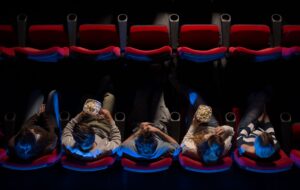Last month, like many, I went to see the newly released Superman movie by James Gunn. As a kid, I loved the 1978 Superman film with Christopher Reeve and the scene when he takes Lois Lane for an evening flight is one of my favorites. Margot Kidder portrayed Lane as smart and quirky — and I wanted to be just like her — and I was intrigued to see that Rachel Brosnahan is now playing the role. I’m a big fan of Brosnahan, after binging The Marvelous Mrs. Maisel, and her portrayal of Lois Lane did not disappoint.
The film itself was enjoyable, but later, I kept thinking about the whole moviegoing experience.
Over the years, I’ve had many types of movie viewing experiences. As a kid, my parents would treat us by going to the drive-in, and I remember being so excited about my first IMAX film. Now that I’m older, I’ve enjoyed seeing older flicks in nostalgic settings, like at The Allen Theatre, and I’ve enjoyed an adult beverage during a show at The Alamo Drafthouse Cinema. I’ve been to theaters that have seats like folding chairs and others that have couches. When it comes to timing, I prefer matinee shows not only due to minimal crowds and cost-effective ticket prices, but also because there are fewer restrictions for early showings. Usually there is no ticket-taker upon entry and heading into the theater works on something of an honor system. At early shows I can bring in a Yeti full of coffee and a bag full of snacks without fear of being reprimanded.
I decided to go to a 10:10am showing of Superman at Flagship Cinemas, where the seats are spacious, heated recliners. And I was thankful for the extra space when, despite the theater being largely empty, other audience members showed up and sat down right beside me. I thought it funny that neither the new guests nor I felt like moving from the seats we were assigned, even though we could claim a whole row all to ourselves.
Sticking to an assigned seat isn’t always my forte. I have tried to make my way closer to a concert stage and have moved up in the bleachers at an ice hockey game. But that morning the seats were big enough and spaced out enough that having someone beside you didn’t matter much and, truth be told, I felt a bit compelled to stay seated so as to not insult the moviegoers beside me. For some reason I thought it would make it seem like they weren’t worth sitting next to (though, in reality, they might have preferred it if I moved).
As I remained in my designated spot and the movie progressed, it was fun to hear the gasps and laughs, and oohs and aahs, alongside my own. When audience members are engrossed in a scene that prompts a reaction, it makes for a more interactive experience. When audience members distract from what’s on the screen, however, it can be beyond off-putting.
Theater companies, as well as movie makers, want any film experience to be a positive one. That means seeking quality not only in the movie but in the viewing environment, and ensuring both is no easy task. Individuals have different preferences for what they want to watch, how they want to watch, and with whom they watch it. The subjective value placed on each experience will inevitably vary with each individual.
Indeed, human action is a complex matter. The decisions we make, behaviors we partake in, and what rules we bend or break are predominantly self-determined (if not to be bound by rules of law). My decision to stay in my seat while watching Superman was based on the options available, my personal preferences, and my thoughts on how it might impact the other movie-goers. As for the snacks I brought in, I didn’t hold back from pulling them out from my handbag or drinking my brought-from-home beverage. I’ve become rather resourceful with refreshments over the years, and my kids are always mortified when I bring food into entertainment events to avoid concession stand prices. Fortunately, some places have embraced the idea of letting guests bring in their own food — ranging from amusement parks like Disney World to concert venues like Bethel Woods — and this option has added to my level of satisfaction. Venues tend to leverage the fact that they have a captive market, and so prices for a mere hotdog can be shocking. I’m more than happy to splurge on treats but less enthused to overspend just on fighting hunger pangs. It would be good for such venues to remember that they are not just selling tickets but fan experiences, and positive experiences can lead to repeat attendees and glowing reviews.
I can afford going to various events and shows because I’m savvy about spending, particularly when it comes to little things like coffee and snacks. And while I may sneak in snacks to morning movie showings (since the theater’s popcorn machine isn’t even turned on yet), I still adhere to societal norms. I would never bring in any food item that had a strong smell or was loud or obnoxious to eat (for a hilarious example, see Mr. Bean trying to eat candy during a church service).
A good society is derived from respectful and rational individuals more so than top-down restrictions and impositions. The curious nature of human action and social order is directly discussed in Leonard Read’s 1975 publication, Castles in the Air.
In Chapter 2, “Freedom: A New Vision,” Read explains that freedom is a means to social order.
In brief, the freedom philosophy or the free market is a way of life. But it differs from most philosophies in that it does not prescribe how any individual should live his life; there are no fixed concepts. It allows freedom for each to do as he pleases—live in accord with his own uniqueness as he sees it—so long as the rights of others are not infringed, which is to say, so long as no one does anything which were everyone to do would bring all of us to grief or ruin. In short, this way of life commends no controls external to the individual beyond those which a government limited to keeping the peace and invoking a common justice might impose. Each individual acts on his own authority and responsibility.
And in Chapter 3, aptly titled “The Mystery of Social Order,” Read conveys the power of individuals and the importance of autonomy.
Why is social order so mysterious? It is mysterious because no one can describe it in advance. Opposed to the perfect cadence of the goose step is the blessing that flows from everyone peacefully pursuing his own goals, going his way, that is, every which way, in constant flux, milling around, each person responding to his own ever-changing aspirations, abilities, uniqueness. Instead of our being carbon copies of some know-it-all, we are what we were meant to be: originals!
So, in closing, let me refer back to Clark Kent, almost definitionally ‘unique.’ Just as Superman takes pride in using his abilities for good, we can choose to use ours in accordance with promoting a rational, respectful, and free society — while aiming to be the best version of ourselves.
In fact, my favorite scene in the new Superman is when Clark Kent revisits his childhood home and discovers the love he received from his human parents, in addition to the lessons they instilled in him during his upbringing, matter more than that of the planet he came from. ‘Pa Kent’ puts things in perspective for Clark by plainly stating “Your choices, your actions, that’s what makes you who you are.” And when (spoiler alert) Superman defeats Lex Luthor, Clark proudly proclaims that despite being different, he is human after all.





